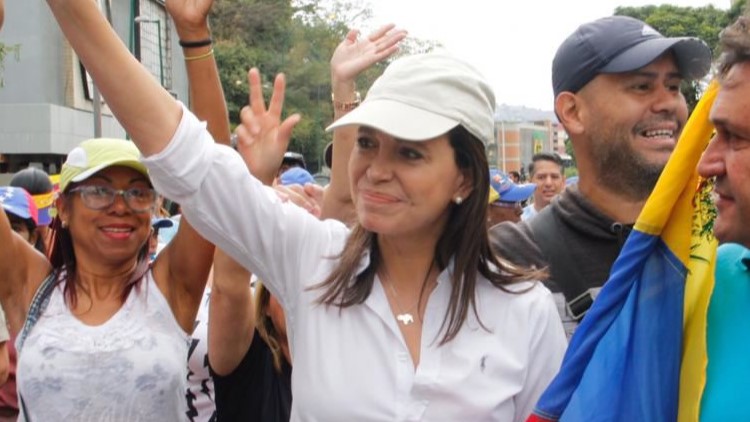Eduardo González
Some thirty former Ibero-American heads of State and Government, including the former President of the Spanish Government José María Aznar, have denounced the disqualification of the opposition presidential candidate María Corina Machado in Venezuela and have asked the European Union and the United States, among others, to act “consequently” after this “open violation of the Barbados Agreement” between the Government and the opposition.
The letter was signed on January 27 by “the former heads of State and Government of the Democratic Initiative of Spain and the Americas (IDEA)”, after learning of “the decision of the Supreme Court of Justice of Venezuela” to politically disqualify “a the presidential candidate of the democratic opposition, María Corina Machado, without any prior or substantiated cause or file” and without having been subjected to “a final criminal sentence, as demanded by the Constitution and international jurisprudence on Human Rights.”
Specifically, last Friday the Political-Administrative Chamber of the TSJ ratified the disqualification for fifteen years of the two-time presidential candidate Henrique Capriles and Corina Machado, presidential candidate of the Democratic Unitary Platform (PUD) after obtaining more than 92 percent of the votes. in the primary elections on October 22. The Court has removed Machado from the presidential elections (scheduled for the second half of this year) for having been “a participant in the corruption plot orchestrated” by the former president of Parliament Juan Guaidó.
According to the signatories of the letter, Machado, “in accordance with the rules of democracy,” continues to be “the legitimate representative of the opposition in Venezuela and its presidential candidate before the international community,” for which she has had the support, in the primary elections, of “a decisive majority of Venezuelans.”
“The actions of the dictatorship of Nicolás Maduro Moro, through a Supreme Court whose leadership has recently been entrusted to a member of the official party, a former councilor, without legal practice or judicial and even less academic experience, proves his repeated contempt for the elements essential and fundamental components of democracy, as stated in the Inter-American Democratic Charter,” the letter continues.
“In the face of the open violation of the Barbados Agreements, under which the regime committed to respect ‘the right of each political actor to select its candidate and in accordance with its internal mechanisms’, the governments of the guarantor countries must act accordingly,” warns the joint statement.
“In particular, the signatory governments of the declarations issued as a result of the aforementioned agreements must also react, namely the United States, which partially lifts its sanctions against the dictatorship of Maduro Moros; “Canada, the United Kingdom and the European Commission, whose dignitaries we addressed on October 26 to alert them about the criminalization that their representatives, including the first lady, Cilia Flores, were preparing since then to stop the candidacy of María Corina Machado,” the letter continues.
Likewise, “the European Union must assert its commitment to ensure ‘Venezuela’s return to the democratic path‘”, as its High Representative, Josep Borrell, expressed on January 22 in a communication addressed to the European Parliament and in which “the constitutional disqualification of María Corina Machado” was noted.
The letter, released by former Colombian president Iván Duque through his account on the social network Piñera, the Ecuadorians Guillermo Lasso, Lenin Moreno, Lucio Gutiérrez, Osvaldo Hurtado and Jamil Mahuad, the Costa Ricans Óscar Arias, Laura Chinchilla, Rafael Ángel Calderón, Miguel Ángel Rodríguez and Luis Guillermo Solís, the Paraguayans Mario Abdo, Federico Franco and Juan Carlos Wasmosy , the Mexicans Felipe Calderón and Vicente Fox, the Argentine Mauricio Macri, the Uruguayan Luis Alberto Lacalle, the Panamanians Nicolás Ardito, Ernesto Pérez and Mireya Moscoso, the Bolivians Jorge Quiroga and Carlos Mesa and the Salvadoran Alfredo Cristiani.
Albares: “It is not in line with what Spain would like to see”
Last Monday, the Minister of Foreign Affairs, José Manuel Albares, assured before the Foreign Affairs Commission of Congress that the decision of the Supreme Court of Justice of Venezuela “does not broaden pluralism and is not in line with what Spain would like to see”.
In mid-October, the United States announced the six-month lifting of sanctions on Venezuelan oil and gas after the Maduro Government and the Democratic Unitary Platform reached an agreement in Barbados to hold presidential elections in the second half of 2024 and with the presence of international observers.
A month later, the EU Foreign Affairs Council renewed the sanctions against Venezuela for a period of six months, instead of one year, after Spain recommended the review of these measures in response to the Barbados Agreement. These restrictive measures include an embargo on weapons and equipment for internal repression, as well as a travel ban and asset freeze of 54 people included on the list.
This past Monday, the European Union was “very concerned” about the Supreme Court’s decision to ratify the disqualification of María Corina Machado and Henrique Capriles. “Decisions aimed at preventing members of the opposition from exercising their fundamental political rights can only undermine democracy and the rule of law,” the European External Action Service stated in a press release. For this reason, the EU called for “the full application of the Barbados Agreement and the continuation of an inclusive dialogue process that can lead to fair and competitive elections in 2024.”






